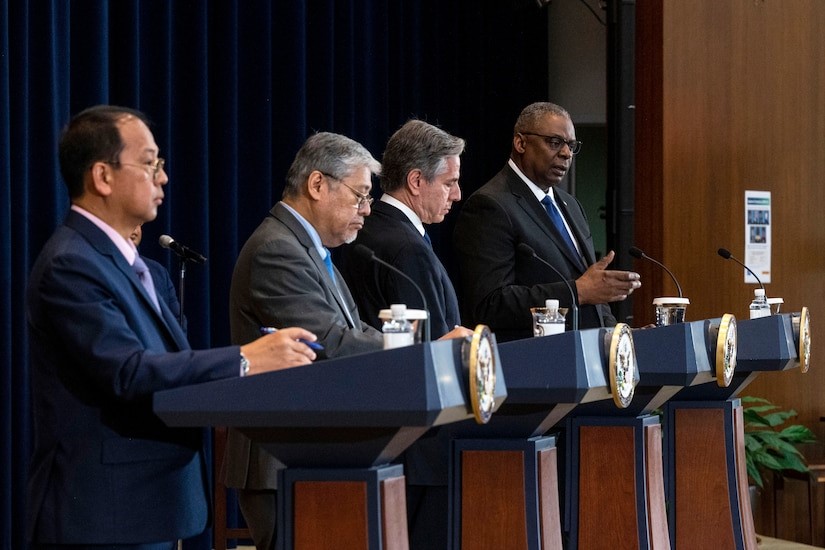Relations between Manila, a long-time U.S. ally, and Washington deteriorated dramatically during the Obama Administration. The failure of the Obama Administration to respond to China’s 2013 aggression towards the Philippines was a crucial factor in the alienation.
The facts are harsh and undeniable. China took possession of almost every off-shore Philippine oceanic economic claim, although some access has been allowed. From the 2011 attack on Philippine fishing boats within Manila’s Exclusive Economic Zone and throughout the Obama Administration, America was essentially missing in action in response to the aggression. Overall, the Obama Administration did nothing, not evening lodging a diplomatic protest, to assist one of America’soldest regional allies.
Relations between the two nations improved markedly during the Trump Administration. That trend continues as China engages in increasingly belligerent actions in the region.
In April, U.S. and Philippine leaders met to discuss the nations’ military, economic and humanitarian partnership at a meeting in Washington.
Secretary of State Antony J. Blinken, Secretary of Defense Lloyd J. Austin III, Philippine Officer in Charge of the Department of National Defense Carlito Galvez Jr. and Philippine Secretary of Foreign Affairs Enrique A. Manalo gathered at the U.S. State Department in Washington D.C.
The Mutual Defense Treaty between the U.S. and the Philippines, signed in 1951, “remains the bedrock of our cooperation,” Austin said, noting that the treaty applies to armed attacks on either nation’s armed forces or public vessels anywhere in the South China Sea.
At the meeting, discussions included modernizing the Philippine armed forces and operationalizing the four new sites in Palawan and northern Luzon under the Enhanced Defense Cooperation Agreement, which was signed on Feb. 1.
Those four new sites are Naval Base Camilo Osias, Camp Melchor Dela Cruz, Balabac Island and Lal-lo Airport. The five existing sites are Cesar Basa Air Base, Fort Magsaysay Military Reservation, Lumbia Air Base, Antonio Bautista Air Base and Mactan Benito Ebuen Air Base.
These nine sites will support combined training exercises and military interoperability, Austin said, adding that by the end of fiscal year 2023, a forecasted $100 million in infrastructure will be invested at the sites.
The discussion also focused on “near-term plans to complete a security-sector assistance roadmap to support the delivery of priority defense platforms over the next five to 10 years, including radar, unmanned aerial systems, military transport aircraft and coastal- and air-defense systems,” Austin said. Talks included planning combined maritime activities with the U.S., Philippines and other ally and partner nations in the South China Sea later this year to enhance collective deterrence.
Austin mentioned that more than 17,000 troops are participating in Exercise Balikatan. It is the largest and most complex iteration of that annual exercise which began 38 years ago.
Blinken touted the economic partnership, including the Indo-Pacific Economic Framework for Prosperity with the Philippines and other partners across east and south Asia, as well as Australia and New Zealand.
Not unexpectedly, China has reacted angrily. According to Radio Free Asia, Beijing insists that “Granting the United States greater access to Philippine military bases will drag the Southeast Asian nation into ‘geopolitical strife.” to contain its growing regional influence.
The moves follow a statement in December by the U.S. State Department that “The United States supports the Philippines’ continued calls upon the People’s Republic of China (PRC) to respect the international law of the sea in the South China Sea, as reflected in the UN Convention on the Law of the Sea, and its legal obligations pursuant to the 2016 arbitral ruling. The reported escalating swarms of PRC vessels in the vicinity of Iroquois Reef and Sabina Shoal in the Spratly Islands interfere with the livelihoods of Philippine fishing communities, and also reflect continuing disregard for other South China Sea claimants and states lawfully operating in the region. Furthermore, we share the Philippines’ concerns regarding the unsafe encounter that the PRC Coast Guard initiated with Philippines naval forces in the South China Sea, as documented before the Senate of the Philippines on December 14.”
Photo: U.S., Philippine officials meet (DoD )
